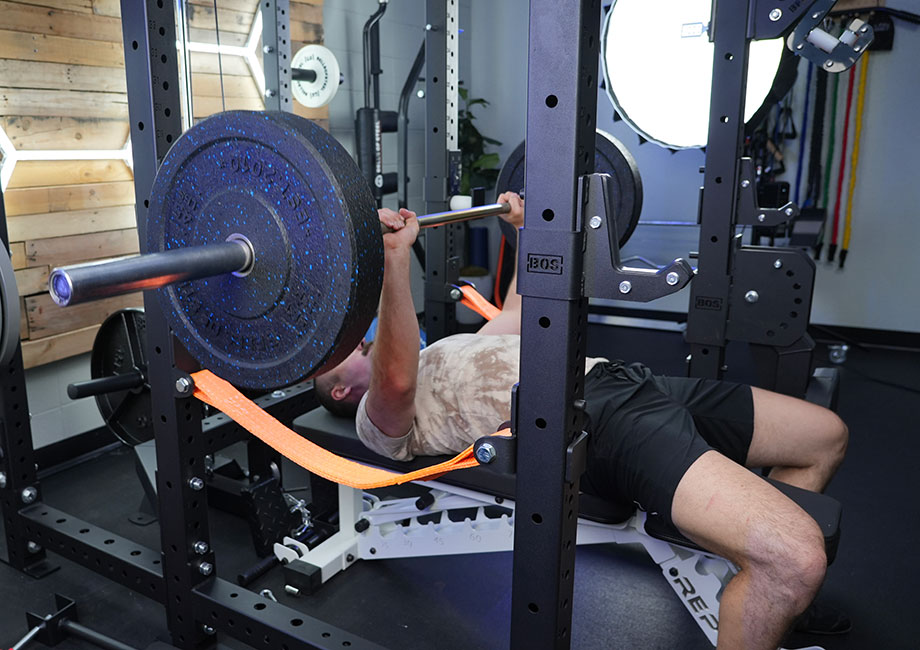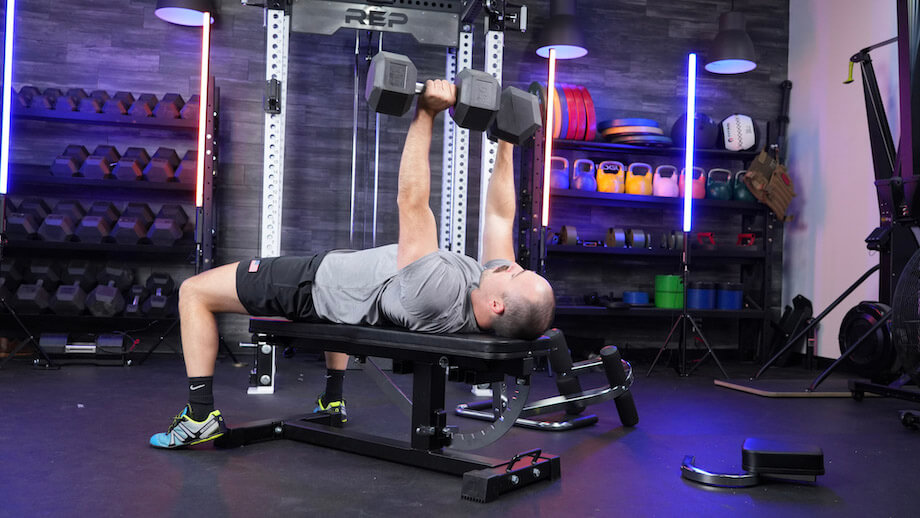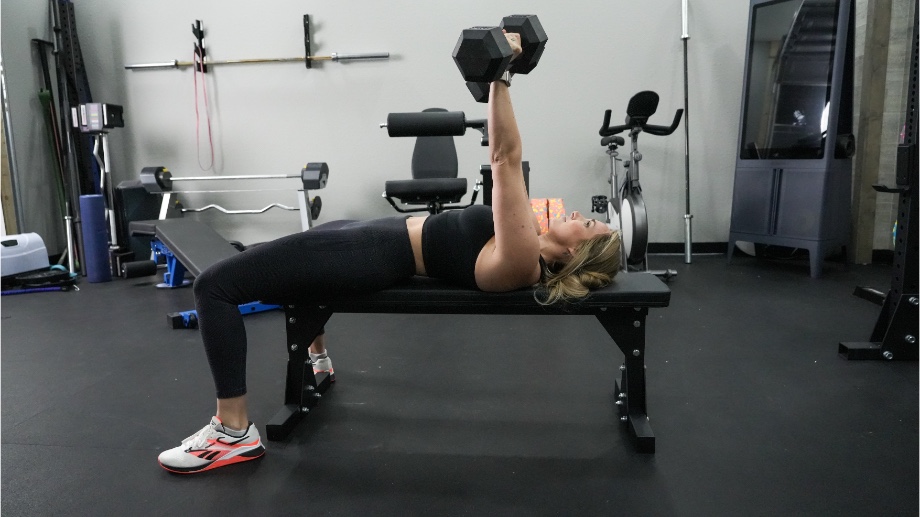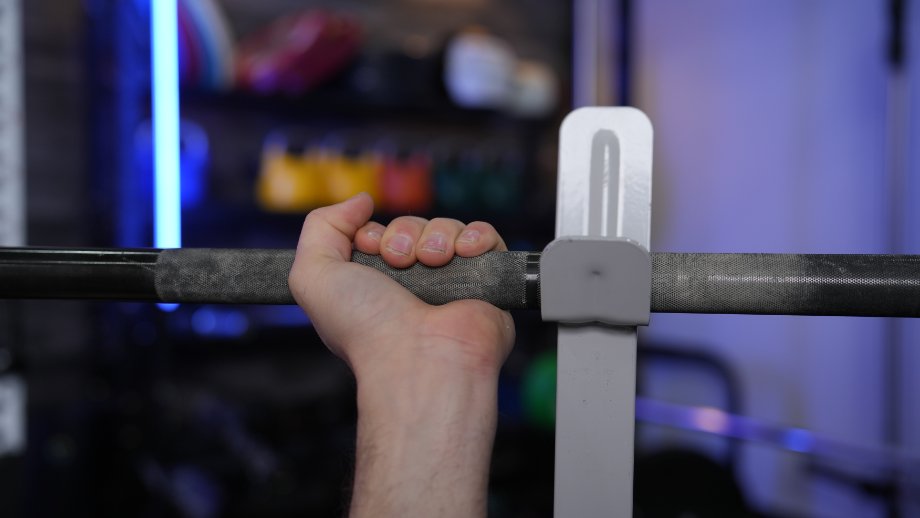We test and review fitness products based on an independent, multi-point methodology. If you use our links to purchase something, we may earn a commission. Read our disclosures.
If you’re training to get stronger, you may incorporate the bench press into your workout routine along with other full-body compound movements like the squat, deadlift, and overhead press. The bench is a staple movement to target your pecs and triceps while developing stability in your upper back—through your deltoids, rhomboids, and lats.
While many folks perform both the barbell bench press and dumbbell bench press, if you’re new to training, you may not be doing both yet (and that’s OK). To reduce your risk of injury, we’ve developed a handy dumbbell to barbell converter tool to help you estimate your training potential using both pieces of equipment.
What Is the Dumbbell-Barbell Converter?
Whether you train in your home gym or at a commercial gym, it’s never a bad idea to recognize your strength capabilities when using dumbbells or a barbell set. We developed this dumbbell-to-barbell converter tool to help you better understand how much weight you can press when switching from a barbell to a dumbbell (or vice versa).
You can perform the bench press with either a barbell or a pair of dumbbells, and there are tons of variations, including the floor press, Larsen press, and incline or decline press, to name a few.
For the purposes of our converter tool, we’re talking about a bench press performed on one of the best weight benches with your feet planted on the floor. Although you can use kettlebells or a curl bar if you have limited workout equipment, this tool focuses on the use of traditional dumbbells, adjustable dumbbells, and the best Olympic barbells.

How We Gathered The Data
To develop this dumbbell-to-barbell converter tool, the Garage Gym Reviews team launched a survey comparing participants’ average barbell bench press weight to their average dumbbell bench press weight.
We had 416 survey participants and found the average barbell press weight from our sampling was 205.79 pounds. Additionally, the average dumbbell bench press weight was 151.43 pounds—a total of the two dumbbells—representing a pair of 75-pound dumbbells.
From our survey, we found that on average, experienced weightlifters can lift 35.9% more with a barbell than on the dumbbell bench press.

How To Use Our Bench Press Converter
The tool below is based on the weight you can bench between 8 to 10 repetitions. In the first block, you’ll enter your 8 to 10 rep max total dumbbell weight (25-pound dumbbells in each hand would be a 50-pound total). The tool will help you find a suitable weight for bench pressing on the barbell. Use the second block to enter your current 8 to 10 rep max on the barbell bench press to find out how much is appropriate to bench with dumbbells.
RELATED: Reps vs Sets
How This Tool Can Be Useful For Your Training
This dumbbell-to-barbell converter tool can be useful for beginners to understand how to convert dumbbell weight to barbell weight because it’s not an apples-to-apples comparison. Most beginners start with pressing dumbbells because the starting weight is much lighter. Dumbbells are also a great way to gain stability and create motor unit (aka neurological) adaptations1, which is a fancy way of saying that both the brain and the body coordinate to learn new movements patterns.
Once your motor neurons adapt to the bench press movement, you can challenge your strength potential by using the barbell. Most lifters are stronger on the barbell bench due to the added stability of both hands versus one hand per dumbbell handle.
RELATED: Bowflex 1090 Adjustable Dumbbells Review
If you’re a novice lifter, we encourage you to use our converter tool to help you better understand your potential under a barbell. This can help you stay humble loading barbell weight and reduce your risk of injury. We don’t encourage ego-lifting around here.
It’s helpful to understand your capacity and potential on each type of lift to keep you progressing in your strength training journey. Let’s face it: you could progress the weight on your bench press, but sometimes you just don’t feel like it. This is especially true if you program your own workouts (IYKYK).
Lastly, we think it’s a great tool for experienced lifters who may have limited gym equipment and want to know exactly how much to use on dumbbells when they don’t have access to a barbell.

To use this converter tool to its full potential, you’ll want access to the following fitness equipment:
- Weight bench
- Power rack, rig, or half rack
- Olympic 45-pound barbell
- Variety of weight plates (5-, 10-, 25- and 45-pound plates)
- Wide range of urethane, iron, or hex dumbbells (10- to 50-pound dumbbells or more)
- Adjustable dumbbells (if not using fixed dumbbells)
Additionally, it’s worth mentioning that we’ve actually tested and reviewed two unique products that literally convert dumbbells into either a barbell or kettlebell. You can read more about each in our Jayflex HYPERBELL Bar review and our Kettle Gryp review.
Dumbbell-to-Barbell Converter: Final Thoughts
Our dumbbell-to-barbell converter is just one more tool to add to your home fitness toolbox. It’s a simple way to help you check-in with your bench press potential regardless if you’re using a dumbbell or barbell. Plus, you can use this tool to double-check your training weights if you’re showing signs of overtraining.
Dumbbell to Barbell Converter: FAQs
Why is the dumbbell bench press more difficult?
Dumbbells often feel more difficult because each arm is stabilizing an individual weight. When using a barbell, both arms stabilize one object, making it feel easier to press the same weight (or more).
Which one should you do first: Dumbbell or barbell bench press?
We suggest starting with dumbbells if you’re a beginner to the bench press.
However, in terms of which you should perform first on a given workout, starting with the barbell bench (typically heavier and fewer reps) is an ideal way to start a strength workout, moving on to lighter accessory work with dumbbells.
How many days per week should I bench press?
Most folks can see strength gains and improvements by benching and performing pressing exercises once per week. Competitive powerlifters and bodybuilders typically bench press and target chest muscles twice per week.
That said, we suggest balancing your pressing movements with equal pulling movements. This can include barbell rows, one-arm dumbbell rows, pull-ups, and lat pulldowns.
How do I know if I’m doing a bench press correctly?
One of the main indicators that your bench press form is incorrect is if your shoulder girdle isn’t stable and pinned to the weight bench. Your shoulder blades should stay pinched and stable on the bench, while your shoulder girdle remains away from your shoulders during the entire set.
Why should I train with both barbells and dumbbells?
Training the bench press with both barbells and dumbbells allows you to train different ranges of motion, sets, reps, and loads, all essential training techniques of progressive overload and the key to getting stronger.
References
- Lisa Griffin and Enzo Cafarelli. 2005. Resistance Training: Cortical, Spinal, and Motor Unit Adaptations. Canadian Journal of Applied Physiology. 30(3): 328-340.
Further reading

In this Kaged Muscle Pre-Kaged review, we’ll let you know how this pre-workout supplement stacks up to the rest—straight from an R.D. Read more

Find out about our experience with these tube bands in this Torroband review. Read more

We’ve got seven tips for running in the heat, and how to know when to take your run indoors. Read more

Interested in a weighted vest but don’t want to spend a lot of money? You can make your own! Create a DIY weight vest using our step-by-step guide. Read more

